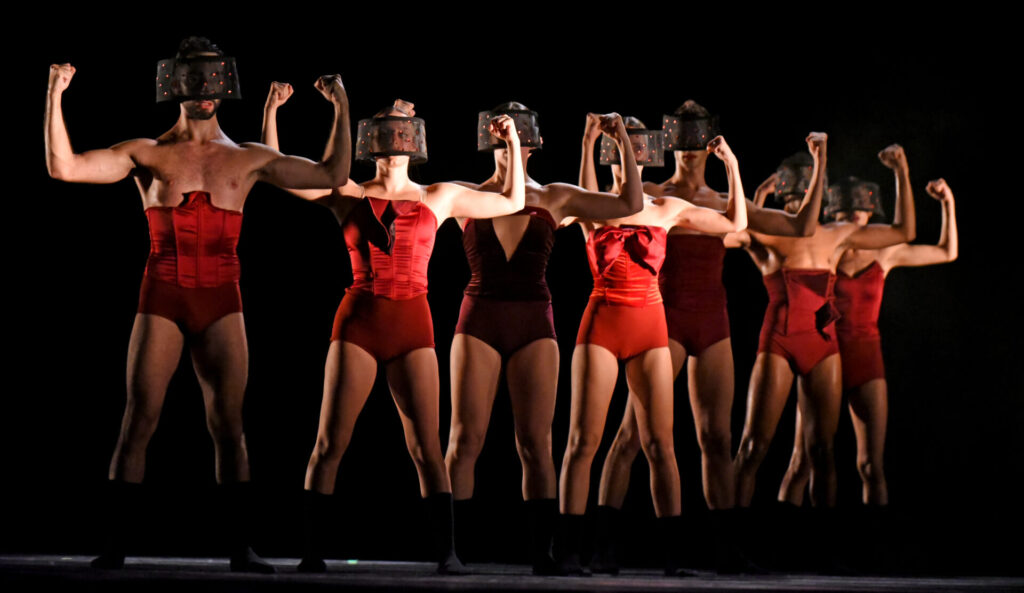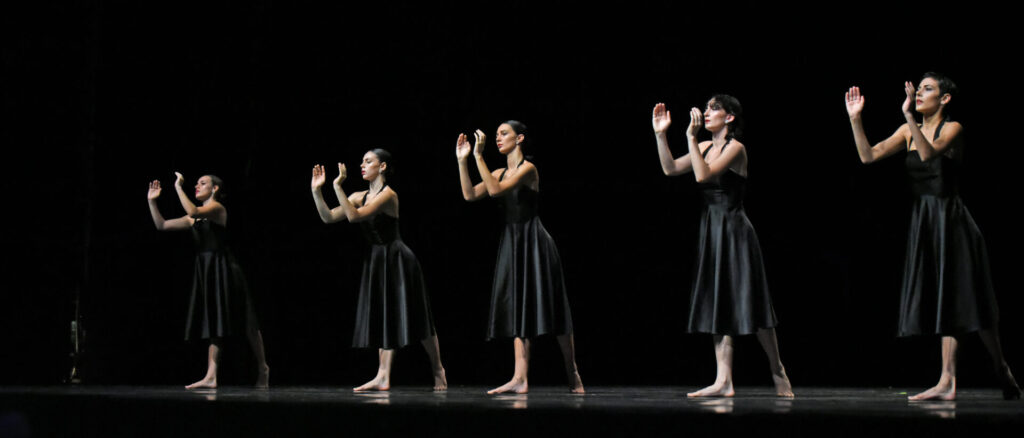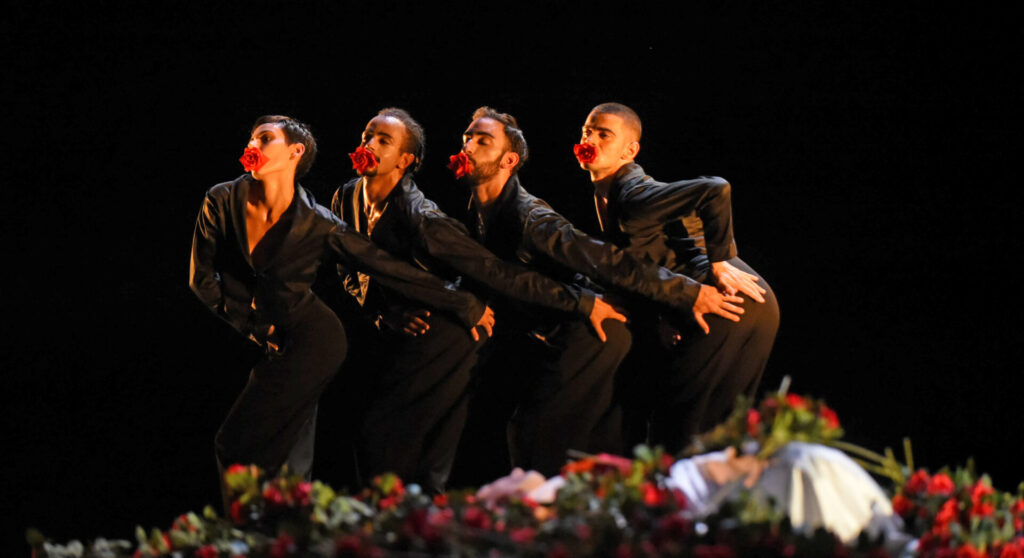
OPEN REHEARSAL
The Fonderia’s 2023/24 season opens with CALLAS CALLAS CALLAS, the new production by COB Compagnia Opus Ballet.
The evening pays homage to the great singer by bringing together for the first time three of the most interesting names in Italian auteur choreography, Adriano Bolognino, Carlo Massari and Roberto Tedesco (a former dancer of Aterballetto), in a contemporary and innovative interpretation of one of the most iconic personalities of the 20th century.
Each choreographer brings to the stage a different aspect of the life and work of Maria Callas in a true “choreographic triptych”, an unprecedented fresco in which biographical elements, musical inspirations and iconography merge with contemporary dance in the creation of an original language.
The project ideally continues the artistic research path that the company has been pursuing for years and that sees contemporary dance dialoguing with classical stories and music, considered “repertoire” that become fertile ground for the creation of something completely different. The classic becomes a key to the contemporary world, with the aim of deconstructing and enriching the repertoire to speak of a lived reality, tangible, close to us.
The performance is on Wednesday 4 October at 8.30 p.m.
CALLAS, CALLAS, CALLAS
Choreographies by Adriano Bolognino, Carlo Massari and Roberto Tedesco
A production COB Compagnia Opus Ballet
In co-production with Fondazione Festival La Versiliana
Artistic direction Rosanna Brocanello
Artistic advisor Laura Pulin
Light designer Giacomo Ungari
Repetiteur Giulia Orlando
Management Margherita Fantoni
Diffusion Laura Montagna
Italian premiere 12 July 2023, Teatro “La Versiliana” (Marina di Pietrasanta)
***
/DIVINA
Choreography Adriano Bolognino
Performers Giuliana Bonaffini, Aura Calarco, Sofia Galvan, Ginevra Gioli, Gaia Mondini
Choreography Assistant Rosaria Di Maro
Music Vito Pizzo
Costumes by Tns Brand
/STANDPOINTS
Choreography Roberto Tedesco
Performers Matheus Alves De Oliveira, Giuliana Bonaffini, Aura Calarco, Emiliano Candiago, Ginevra Gioli, Gaia Mondini, Riccardo Papa, Frederic Zoungla
Music Giuseppe Villarosa
Costumes by Opificio della Moda e del Costume
/TOUJOURS LA MORT
Original creation Carlo Massari
Performers Matheus Alves De Oliveira, Aura Calarco, Emiliano Candiago, Riccardo Papa, Frederic Zoungla
Musical editing Luca Martone
Supporting the making of costumes Giovanna Ficaccio
***
Running time 75′
A 6-minute break is scheduled among the choreographies.
Gifted with ‘three voices’, it was said, for her exceptional vocal range. And again: talented as a ‘dramatic soprano of agility’, a 19th century description for her unique timbre. A charismatic woman and artist, her voice was powerful and theatrical thanks to her technique and ability to fuse singing and acting, capable of ardent and engaging interpretations in embodying seductive and tragic female characters. Her name is engraved in the history of melodrama. And not only. Art and style, triumphs and acclaim, worldliness and private affairs have intertwined in the life of Maria Callas, ‘La Divina’. We also remember her diva outbursts, the mystery of her drastic weight loss, her chronic insomnia, the son she never had, her friendship with Pasolini and, above all, her inauspicious love affair with the shipping tycoon Aristotle Onassis, who left his wife for her, only to abandon her and marry Jackie Kennedy. Callas died, suffering and alone, in her Paris flat on 16 September 1977, from causes not yet ascertained. In the centenary year of her birth, amidst already celebrated tributes and others in progress, that of the COB Compagnia Opus Ballet directed by Rosanna Brocanello, has a particular value also for the originality that inspired it: entrusting three young, and already established, choreographers with a contemporary language, with a creation for one evening, reflecting their personal vision of the legendary artist, without, however, wishing to describe her. Three different points of view, therefore, three approaches and restitutions in dance that the beautiful title Callas, Callas, Callas already highlights. A title that is also an invitation, for the spectator, to discover or rediscover through the folds of a movement or the ensemble chorus, through the electronic sounds or the fragments of famous arias disseminated in the choreographic architecture, through a light or a costume that shapes gestures and postures, one’s own Callas. Or perhaps another, unprecedented one that abstract dance can suggest, evoke, imprint in the atmosphere and memory. We will certainly recognise, contaminated or barely revealed, three famous arias: from Tosca, Norma, Carmen.

STANDPOINTS by Roberto Tedesco (ph. Paolo Bonciani)
Roberto Tedesco blends the notes of Vissi d’arte on the electronic musical score composed by Giuseppe Villarosa, within which he also mixes excerpts from interviews and interference of voices. In the words of the famous aria, extrapolated from Tosca, the Calabrian choreographer pinpoints the moment when Callas is on the point of death, and wants to reiterate to everyone that she lived profoundly of art and love, being simply a person, a woman, before being considered a diva. It is above all in the sound structure that the choreographer imprints his vision of Callas’s life, as if to predispose the spectator – quoting George Balanchine – to “see the music and hear the dance”. Tedesco interweaves an imaginary dramaturgy with a musical journey, almost chronological, from the years in New York, where Callas was born, to her Greek origins; from Italy, which, with the Teatro alla Scala, gave her her greatest success, to France, where she retired for good. Vague jazz sounds at first recall America, then those of the Bouzouki to Greece, and a piece of light music from the 1970s to the mood of suffering that accompanied her. Over a rising, almost techno rhythm, a choral dance grafts the bodies – male and female, a single entity -, clad in stylised red corsets and black masks in the shape of abatjours.
An aesthetic that harks back to the theatrical costumes of opera, and to that world of fashion of which Callas, inspiring many designers, was also an icon.

DIVINA by Adriano Bolognino (ph. Paolo Bonciani)
The Neapolitan choreographer Adriano Bolognino – a lover of all that is part of that glamorous universe – emphasises this fashionable divism in his creation, emphasising his ‘Callas imagery’ also in terms of aesthetics, combined with the strength, rigour and whimsy of dance.
Speed and rhythm characterise his language. It is embodied by the five dancers with a combative gesturality that underlies certain references from the soprano’s life: her singing, her Greek roots, her failed motherhood, her tormented love affair. Always on stage, the quintet plays between softness and broken movements, rhythms and pauses, to the introductory music composed by Vito Pizzo, which acts as a prelude to flow and close with Casta diva (from a recording by the Opéra de Paris).

TOUJOURS LA MORT by Carlo Massari (ph. Paolo Bonciani)
Carlo Massari, on the other hand, does not engage with any particular sound contaminations in his creative journey through the Callas universe. With a dramaturgy linked to an even ironic component that impacts with the sound dimension, what envelops the ether is, after listening on a loop, the recognisable voice of the singer in the famous Habanera from Carmen – the simple bolero of the costumes recalls Bizet’s opera – and further on the Aria delle carte, when the playing cards predict to the gypsy woman the approach of death. And it is this vision that allows Massari’s choreography, with Callas who, in her physical perishing, lives knowing the end that awaits her. The applause we hear at the beginning accompanies her as she retraces the thread of her existence, until she leaves us with the memory of her sublime voice, of the immortal artist. “There is no movement if there is no thought and there is no thought if there is no sense” is the assumption that has always animated Massari’s work. In line with his own modality that crosses and combines the different languages of the performing arts – theatre, dance, music -, the Bolognese choreographer stages the protagonist accompanied by ‘black souls’, a sort of coloured spirits – the colours of the voice – that follow and support her in her last breath of life.
Everything contributes, in the three creations, to the spectator’s reading of the scenic event, who is thus urged to find his own Callas, to identify his own myth.
by Giuseppe Distefano
Directed by Rosanna Brocanello since its foundation, the company is made up of a stable core of professional dancers and to date has produced a vast repertoire of productions. The latest include: Vivaldi’s Le Quattro stagioni (2020) by choreographer Aurelie Mounier and with music performed live by the Orchestra di Padova e del Veneto; RIGHT. La Sagra della Primavera (2021) by Carlo Massari in a co-production with C&C Company and Teatro Stabile del Veneto, Oriente Occidente Dance Festival, Associazione Culturale Mosaico Danza/Interplay Festival (Project winner of the CollaborAction XL 2020 action Network Anticorpi XL coordinated by the Ass. Cantieri Danza supporto per la danza d’autore); Il labirinto. Il mito di Arianna e il Minotauro (2021) by Arianna Benedetti; White Room (2022) by Adriano Bolognino in collaboration with the Centro Nazionale Virgilio Sieni; La diversità che mi fece stupendo. Pasolini, l’irrealtà del quotidiano (2022) by Giovanni Leonarduzzi in co-production with the Compagnia Bellanda; Coding dance (2023) by Leonardo Diana in co-production with Versiliadanza; OTOTEMAN_what if by Sofia Galvan and Stefania Menestrina, Project winner of the 13th edition of the International Prize Prospettiva Danza Teatro and realised in co-production with Festival Danza In Rete-Teatro Comunale Città di Vicenza. From 2021 the company is financed by the Ministry of Culture.
TICKETS
Full price: 3 euro
Under 6: free
PURCHASING TICKETS
Tickets can be purchased online on www.biglietteriafonderia39.it.
The ticket office service at the Fonderia is open from 5.30 pm.
Tickets are not numbered.
CONTACTS
Mobile and whatsapp 3341023554

